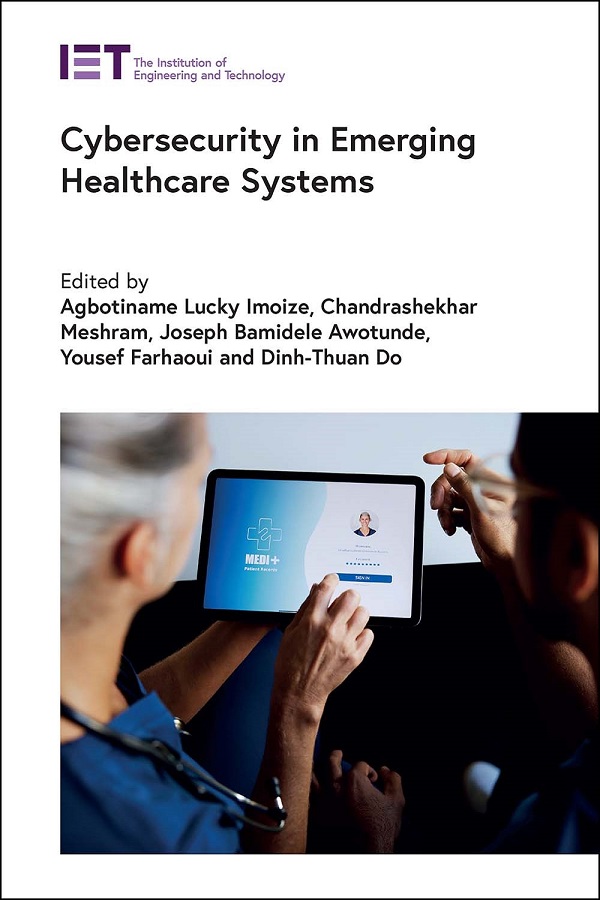- Agricultural Engineering and Technology
- Applied Physics
- Built Environment
- Computing and Networks
- Control, Robotics and Sensors
- Electrical Regulations
- Electromagnetics and Radar
- Energy Engineering
- Healthcare Technologies
- History and Management of Technology
- IET Codes and Guidance
- Manufacturing
- Materials, Circuits and Devices
- Model Forms
- Security
- Telecommunications
- Transportation

Cybersecurity in Emerging Healthcare Systems
Edited by Agbotiname Lucky Imoize, Chandrashekhar Meshram, Joseph Bamidele Awotunde, Yousef Farhaoui, Dinh-Thuan Do
Emerging healthcare networks are interconnected physical systems that use cyber technologies for interaction and functionality. The proliferation of massive internet-of-things (IoT) devices enables remote and distributed access to cutting-edge diagnostics and treatment options in modern healthcare systems. New security vulnerabilities are emerging due to the increasing complexity of the healthcare architecture, in particular, threats to medical devices and critical infrastructure pose significant concerns owing to their potential risks to patient health and safety. In recent times, patients have been exposed to high risks from attacks capable of disrupting critical medical infrastructure, communications facilities, and services, interfering with medical devices, or compromising sensitive user data.
This book seeks to present cyber risk and vulnerability models, considering a number of threats and examining how effective regulations could help guarantee medical device fidelity and trust. The book discusses the application of artificial intelligence and machine learning to provide practical learning-based solutions to address cyberattacks in emerging healthcare systems. The book focuses on the technical considerations, potential opportunities, critical cybersecurity challenges, the prospects and potential benefits of cybersecurity in emerging healthcare systems. Finally, the book presents case studies, highlighting critical lessons, and providing recommendations for designing AI-based cybersecurity architectures for emerging healthcare systems.
Written by an international team of authors, this book is suitable for an audience of industry-based and academic researchers, scientists, and computer engineers working in data science, cybersecurity and wireless communications particularly those specialising in healthcare data science and those in related fields.
About the Editors
Agbotiname Lucky Imoize is a lecturer at the Department of Electrical and Electronics Engineering, Faculty of Engineering, University of Lagos, Nigeria. His research interests include communications networks, IoT devices, and security systems for 5G and 6G wireless communications and healthcare systems. He is a Fulbright research fellow, the vice chair of the IEEE Communication Society, Nigeria chapter, and a registered engineer. He is a senior member of the IEEE.
Chandrashekhar Meshram is an assistant professor with the Department of Post Graduate Studies and Research in Mathematics, Jaywanti Haksar Government Post Graduate College, Raja Shankar Shah University, India. His research interests include cryptography, wireless communications, and network security.
Joseph Bamidele Awotunde is a lecturer in the Department of Computer Science, Faculty of Information and Communication Sciences, University of Ilorin, Nigeria. His research interests include cyber security, m-Health/e-Health systems, IoMT bioinformatics, and wireless body sensor networks.
Yousef Farhaoui is a professor at the Department of Computer Science, Faculty of Sciences and Technic, Moulay Ismail University, Morocco. His research interests include cyber security and computer networks. He is the general chair, session chair, and panellist in several conferences. He is a senior member of IEEE.
Dinh-Thuan Do is an assistant professor at the School of Engineering, University of Mount Union, Ohio, USA. His research interests include 6G wireless communication and AI-based Internet of Things (IoT) systems. He was a recipient of the Golden Globe Award from the Vietnamese Ministry of Science and Technology in 2015 (Top ten excellent scientists nationwide). He is a senior member of the IEEE.
Publication Year: 2024
Pages: 746
ISBN-13: 978-1-83953-951-0
Format: HBK
